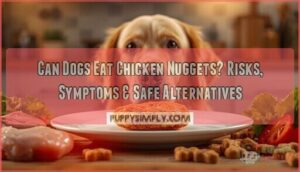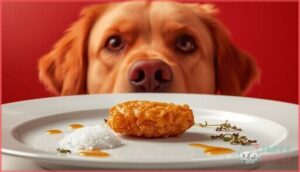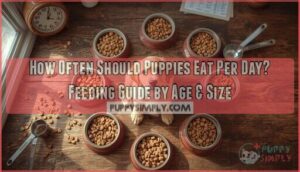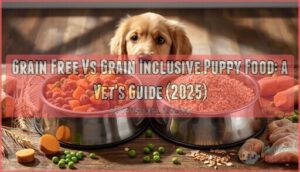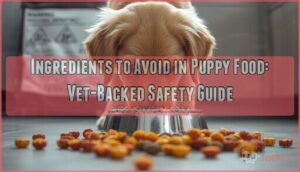This site is supported by our readers. We may earn a commission, at no cost to you, if you purchase through links.
Your dog’s pleading eyes make it hard to resist sharing your fast food, but those golden chicken nuggets harbor risks most pet owners don’t realize. The problem isn’t the chicken itself—it’s the heavy salt, preservatives, onion powder, and fried coating that make these snacks dangerous for your furry companion.
Even a few nuggets can trigger digestive distress, and regular exposure may lead to pancreatitis, salt toxicity, or nutritional imbalances that compromise your dog’s health.
Understanding what’s actually in chicken nuggets, recognizing the warning signs of trouble, and knowing which alternatives keep tails wagging safely will help you make better choices when those hopeful eyes meet yours at mealtime.
Table Of Contents
- Key Takeaways
- Can Dogs Eat Chicken Nuggets Safely?
- What Ingredients in Chicken Nuggets Harm Dogs?
- Health Risks of Feeding Dogs Chicken Nuggets
- Are Fast Food Chicken Nuggets Worse for Dogs?
- What Happens if My Dog Eats Chicken Nuggets?
- Can Puppies Eat Chicken Nuggets?
- Healthy Alternatives to Chicken Nuggets for Dogs
- How Much Chicken Nugget is Too Much?
- Tips for Keeping Your Dog’s Diet Safe
- When Should I Consult a Veterinarian?
- Frequently Asked Questions (FAQs)
- Are chicken nuggets bad for dogs?
- Can dogs eat Tyson Chicken Nuggets?
- Can dogs eat frozen chicken nuggets?
- Can dogs eat vegan chicken nuggets?
- Can dogs eat chicken nuggets from Wendy’s?
- Should I give my Dog a chicken nugget?
- Can I make homemade baked chicken nuggets for my dog?
- Can dogs eat frozen chicken nuggets safely?
- Are spicy chicken nuggets toxic to dogs?
- What about breaded chicken tenders versus nuggets?
- Conclusion
Key Takeaways
- Chicken nuggets contain harmful ingredients like onion powder, garlic, excessive salt, and preservatives that can cause digestive upset, pancreatitis, salt toxicity, and even destroy your dog’s red blood cells, making them unsafe despite not being technically “toxic.”
- Fast food nuggets from chains like McDonald’s, Wendy’s, and Chick-fil-A are particularly dangerous because they pack extreme sodium levels (over 700mg per 100g in some brands), unhealthy frying oils, and seasonings that pose immediate and long-term health risks to dogs.
- Puppies face even greater dangers from chicken nuggets since their developing bodies need at least 22.5% protein and balanced nutrients for growth, while nuggets provide empty calories that can stunt development and damage maturing organs.
- Plain baked chicken breast offers all the protein benefits without the risks, and you can make homemade treats using simple ingredients like chicken, oats, and vegetables—keeping portions under 10% of your dog’s daily calorie intake.
Can Dogs Eat Chicken Nuggets Safely?
Chicken nuggets aren’t technically toxic to dogs, but they’re not safe regular treats. Most commercial varieties carry harmful ingredients that can disrupt dog nutrition and create chicken nugget health risks. While one small bite probably won’t cause an emergency, cooking methods matter, and the deep-fried, heavily processed nature of these foods poses real concerns.
Breed-specific risks, underlying health conditions, and safe nugget size all influence outcomes. Long-term studies show repeated consumption threatens dog food safety, making plain cooked chicken a smarter choice for your pup’s wellbeing. Dogs may experience food allergy issues due to the high risk of chicken allergies.
What Ingredients in Chicken Nuggets Harm Dogs?
Not all chicken nuggets are created equal, but most share a common lineup of ingredients that spell trouble for your dog. From hidden preservatives to seasonings, you’d never intentionally feed your pet; these processed bites pack more than just chicken.
Let’s break down the main culprits that make chicken nuggets a risky choice for your four-legged friend.
Preservatives and Additives
When scanning the ingredients list on that box of nuggets, you’ll spot a lineup of harmful ingredients for dogs. Commercial chicken nuggets often pack preservatives like sodium phosphates and chemical additives such as artificial flavors and colors.
These toxic ingredients can trigger digestive upset, allergic reactions, and over time, may even compromise your dog’s liver function and kidney function, especially with processed meat consumption. Nuggets also often contain unhealthy fats due to being deep-fried in oil.
High Salt and Fat Content
Beyond those chemical additives, the salt and fat levels in chicken nuggets pose serious risks. Sodium levels far exceed what’s safe for dogs, raising the threat of salt toxicity—think excessive thirst, dehydration, and worse. The fat overload from deep-frying triggers pancreatitis risk and fuels the obesity threat. Regular consumption damages heart health through:
- Elevated blood pressure from excess sodium
- Cardiovascular strain from fat accumulation
- Increased risk of diabetes
- Long-term organ stress
Toxic Seasonings (Onion, Garlic)
Now here’s where things get really dangerous: onion and garlic. These toxic ingredients, both part of the Allium family, destroy your dog’s red blood cells, leading to anemia risk. Even small amounts—whether fresh or powdered—trigger toxicity symptoms like lethargy, pale gums, and vomiting.
Onion and garlic destroy your dog’s red blood cells, causing anemia even in small amounts
Canine health deteriorates fast with Allium toxicity, demanding prompt treatment. Safe alternatives avoid these ingredients toxic to dogs entirely.
Breading and Fillers
That crispy coating on chicken nuggets? It’s mostly refined flour and breadcrumbs your dog’s system can’t process well. The breading and processed meat mixed with filler ingredients create digestibility concerns that lead to bloating, gas, and stomach pain.
- Wheat and grains trigger allergic reactions in sensitive dogs
- Meat byproducts in the batter offer little nutritional value
- Heavy breading causes uncomfortable digestive upset
- Regular consumption creates serious nutritional imbalances
Health Risks of Feeding Dogs Chicken Nuggets
Chicken nuggets might seem harmless, but they can cause real problems for your dog’s health. The combination of high fat, excessive salt, and processed ingredients creates several risks that every dog owner should understand.
Let’s look at the specific health issues that can develop when dogs eat chicken nuggets regularly or even just occasionally.
Gastrointestinal Upset
If your dog snags a chicken nugget, you might notice vomiting and diarrhea within hours. The high fat content and artificial additives in these fried treats often trigger digestive discomfort, especially in sensitive dogs.
Deep-frying loads nuggets with oils that disrupt normal dog digestive health, leading to gastrointestinal upset in dogs. Even small amounts can spark gastroenteritis, causing bloating and stomach pain that leaves your pup feeling miserable.
Pancreatitis and Obesity
Fatty foods like chicken nuggets put serious stress on your dog’s pancreas, often triggering pancreatitis—a painful inflammation that demands emergency vet care. Regular fat intake from nuggets also fuels pet obesity, shortening your dog’s lifespan.
Pancreatitis and obesity risks include:
- Severe abdominal pain requiring hospitalization
- Loss of appetite and dehydration
- Joint problems from excess weight
- Increased diabetes risk
- Shortened lifespan and reduced quality of life
Healthy weight through proper diet management protects your dog’s pancreas and overall wellbeing.
Salt Toxicity and Dehydration
Chicken nuggets pack excessive sodium that disrupts your dog’s water balance and electrolyte levels. High salt intake strains kidney function and causes dangerous dehydration, especially in smaller dogs or those with existing kidney impact.
When sodium poisoning strikes, you’ll notice extreme thirst response, tremors, or seizures—signs of salt toxicosis requiring urgent care. The health risks for dogs from this hidden toxicity shouldn’t be underestimated.
Long-Term Nutritional Deficiencies
Relying on processed nuggets pulls your dog away from a balanced diet, creating nutritional deficiency over time. These unhealthy ingredients lack vitamins, minerals, and fiber essential for dog health and nutrition, leading to long-term health consequences like immune compromise and organ impairment.
- Vitamin deficiencies weaken immune function and cell repair
- Mineral imbalances affect bone strength and metabolism
- Fiber absence disrupts healthy digestion and gut microbiome
- Immune compromise increases vulnerability to infections
- Organ impairment develops from chronic nutritional gaps
Are Fast Food Chicken Nuggets Worse for Dogs?
Fast food chicken nuggets are, unfortunately, some of the worst offenders regarding dog-unfriendly ingredients. These popular menu items are loaded with excess salt, unhealthy fats, and mystery seasonings that can spell trouble for your pup’s digestive system.
Let’s take a closer look at what different fast food chains are serving up and why you should keep those nuggets to yourself.
McDonald’s, Wendy’s, Chick-fil-A, and Others
When you’re staring at your fast-food bag and your pup’s giving you those eyes, it’s worth knowing what you’re dealing with. Chain Ingredient Analysis shows McDonald’s chicken nuggets pack around 45% actual chicken, while the rest is batter and oil. Wendy’s chicken nuggets deliver 708mg of sodium per 100g, over 30% of your daily intake. Chick-fil-A grilled nuggets use peanut oil and natural seasonings, but they’re still loaded with salt.
The risks of feeding dogs chicken nuggets are real across all chains, though sodium content comparison and fat composition risks vary slightly between brands.
Differences in Ingredients and Risks
Beyond the brand name on the bag, the real difference lies in what goes into each nugget. Ingredient variations matter because processing methods create distinct risk factors. Some chains use onion or garlic powder, toxic compounds that damage your dog’s red blood cells, while others rely on excessive sodium phosphates.
The dangers of chicken nuggets pile up when you consider nutrient deficits from meat byproducts and chemical preservatives. Ingredients in chicken nuggets vary, but risks of feeding dogs chicken nuggets remain high across the board. Ingredients toxic to dogs hide in breading, seasonings, and oils used for frying.
What Happens if My Dog Eats Chicken Nuggets?
If your dog sneaks a chicken nugget or two, don’t panic just yet. The outcome depends on how many they ate, what ingredients were in them, and your dog’s overall health.
Let’s walk through what signs to watch for, what you should do right away, and when it’s time to call your vet.
Signs of Illness or Allergic Reaction
If your dog has eaten chicken nuggets, watch for allergy symptoms or signs of dog illness that can appear within hours. Roughly 15% of dogs with food allergies react to chicken, making awareness vital.
- Skin Reactions: Red, itchy patches on paws, belly, or ears that your dog can’t stop scratching
- Digestive Symptoms: Vomiting, diarrhea, or excessive gas signaling food intolerance
- Behavioral Changes: Unusual lethargy, restlessness, or constant paw licking
- Anaphylactic Shock: Rare but serious—facial swelling or breathing difficulty demands emergency care
Immediate Steps to Take
After spotting signs of dog illness, quick action matters. Assess consumption by checking how many nuggets vanished, then monitor symptoms like vomiting, diarrhea, or lethargy over the next few hours.
| Timeframe | Supportive Measures | Red Flags |
|---|---|---|
| 0-30 min | Provide fresh water | Repeated vomiting |
| 30 min-2 hrs | Keep dog calm, observe | Severe diarrhea |
| 2-6 hrs | Note appetite changes | Breathing difficulty |
| 6+ hrs | Watch energy levels | Signs of toxicity |
Prepare intervention details—ingredients, quantity—for veterinary contact if symptoms worsen.
When to Contact a Veterinarian
Call your vet immediately if you notice breathing difficulty, continuous vomiting, or bloody diarrhea. Severe symptoms like lethargy, excessive drooling, or abdominal pain require urgent attention.
Watch for delayed reactions over 24–48 hours, as some health problems appear gradually. Toxic ingestion involving onion or garlic demands emergency care.
For dogs with food allergies, allergy monitoring becomes essential even after mild symptoms.
Can Puppies Eat Chicken Nuggets?
Puppies aren’t miniature adults, and their growing bodies have very different nutritional requirements than mature dogs. Feeding chicken nuggets to puppies comes with even greater risks, since their developing systems can’t handle the high fat, salt, and additives found in processed foods.
Let’s look at why puppies need specialized nutrition and what dangers chicken nuggets pose to growing dogs.
Puppy Nutritional Needs
Puppies are growing machines, and their nutritional needs reflect that reality. Your puppy requires a minimum of 22.5% protein in their diet, considerably higher than the 18% needed for adult dogs, to support rapid muscle and tissue development.
They also need about twice the calories per pound compared to their grown-up counterparts, with energy sources including healthy fats, which should comprise at least 8.5% of their diet. Essential fatty acids, especially omega-3s like DHA, support brain and eye development.
Calcium balance is equally critical, though large breed puppies require careful supplementation to avoid skeletal issues.
Risks for Growing Dogs
Growing bodies don’t bounce back from poor nutrition like adult dogs might, making chicken nuggets particularly risky for your puppy. The high sodium and fat content in nuggets can interfere with bone development and compromise immune system function, which is still maturing during those critical first months.
Preservatives and chemical additives may also contribute to organ damage over time, while the empty calories displace essential nutrients your puppy desperately needs. Regular exposure can lead to growth stunting and serious nutritional deficiencies that affect your dog’s long-term health.
Skip the chicken nuggets entirely and stick with puppy-appropriate chicken nugget alternatives instead.
Healthy Alternatives to Chicken Nuggets for Dogs
If you want to treat your dog without the health risks that come with chicken nuggets, there are plenty of better options you can reach for. These alternatives give your dog the protein, flavor, and satisfaction they crave, without the harmful additives, excess salt, or unhealthy fats.
Let’s look at some safe, nutritious choices that will keep your dog’s tail wagging and their body healthy.
Lean Cooked Chicken
Plain cooked chicken breast meat stands out as the best protein source for your dog’s diet. This lean chicken meat delivers essential amino acids with exceptional digestibility, making it ideal for canine nutrition.
Consider these benefits:
- Helps weight control without sacrificing muscle mass
- Provides joint support through natural glucosamine
- Offers 30 grams of protein per 100-gram serving
- Promotes healthy skin with omega-6 fatty acids
Safe Vegetables and Snacks
Your dog can enjoy several safe vegetable portions alongside lean protein. Cooked sweet potatoes, carrots, and pumpkin make excellent healthy dog treats, packed with fiber and vitamins. Green beans, broccoli, and zucchini also work well as healthy dog snacks.
However, practice toxic vegetable avoidance—never feed onions, garlic, or raw potatoes. These healthy snack options support balanced diet importance without processed additives.
Homemade Dog Treat Recipes
You can make homemade chicken nuggets that are actually healthy dog treats for your pet. Start with canned chicken, oats, and eggs—no breading or seasonings needed. Baking guidelines suggest 350°F for 25 minutes until golden.
- Mix sweet potatoes or pumpkin for fiber and vitamins
- Add coconut oil for healthy fats
- Use carrots for natural crunch
- Recipe customization lets you avoid allergens
- Ingredient benefits include protein without harmful additives
How Much Chicken Nugget is Too Much?
There’s no magic number regarding chicken nuggets and dogs, but here’s the truth: less is always better. One nugget mightn’t send your dog to the vet, but making it a habit can quietly pile on health problems over time.
Let’s break down what moderation really means and how often, if ever, you should let your pup sneak a bite.
Moderation and Occasional Feeding
Regarding dog treats and human food for dogs, the 10% rule isn’t just a guideline—it’s essential for pet diet health. Commercial chicken nuggets, even in moderation, shouldn’t become part of your dog’s regular feeding frequency.
An occasional small piece won’t usually cause immediate harm in healthy dogs, but that doesn’t mean it’s safe or wise. Safe amounts depend on your dog’s size, existing dog health conditions, and overall caloric intake.
Risk awareness matters here: dogs prone to pancreatitis or obesity should never get nuggets, while even healthy pups benefit from better treat percentage choices.
Portion Guidelines and Frequency
If you’re considering nuggets at all, actual portions matter more than intentions. Here’s what portion control looks like for different dog sizes when feeding plain, unseasoned chicken—not processed nuggets:
- Extra-small dogs (2–20 lbs): About 1 tablespoon of cooked chicken per serving
- Small dogs (21–30 lbs): Around 2 tablespoons maximum
- Medium dogs (31–50 lbs): Up to 1/4 cup at a time
- Large dogs (51+ lbs): Between 1/3 to 1/2 cup depending on weight
Treat frequency shouldn’t exceed 10% of daily calorie intake, supporting balanced diet principles and proper dog diet and weight management.
Tips for Keeping Your Dog’s Diet Safe
Keeping your dog healthy means staying one step ahead with regard to what goes into their bowl. A few simple habits can protect your pup from the hidden dangers lurking in processed foods like chicken nuggets.
Here’s what you need to focus on to keep their diet safe and balanced.
Ingredient Checking and Food Labels
Reading guides on chicken nugget ingredients can be your first line of defense for dog food safety. Labels often hide artificial additives under vague terms like “processed chicken” or “seasonings,” which may include toxic onion and garlic powders.
Look for safe brands with transparent ingredient lists, and practice portion awareness by checking sodium levels. Label comprehension matters because what seems harmless to you might threaten your dog’s health.
Safe Preparation and Cooking Methods
Beyond label reading, how you prepare chicken matters just as much. Baking temperature should reach at least 350°F to eliminate harmful bacteria, while ingredient control means using lean chicken breast without additives. Skip the frying and seasonings—bake plain chicken for 20 minutes instead.
Storage guidelines recommend refrigerating cooked portions for up to one week, ensuring nutritional balance without the risks commercial chicken nuggets bring.
Regular Exercise and Weight Management
Exercise benefits go far beyond just preventing weight gain from occasional treats. Your dog needs 30 minutes to 2 hours of daily activity, depending on breed and age, to maintain physical health and mental wellbeing.
Regular exercise routines combat obesity, support cardiovascular function, and reduce behavioral issues. Active dogs achieve better weight loss outcomes and stronger immunity, making consistent activity your best defense against diet-related health problems.
When Should I Consult a Veterinarian?
You can’t always predict how your dog’s body will react to new foods, and sometimes a simple snack can turn into a real problem. If your dog has eaten chicken nuggets and you’re worried about symptoms or underlying health issues, it’s time to talk to your vet.
Here are two key situations where professional guidance makes all the difference.
Dietary Concerns and Food Allergies
If your dog shows ongoing skin reactions, digestive upset, or other unusual symptoms, food allergies might be the culprit. Dog food allergies affect about 0.2% of dogs, but chicken is a known allergen for some.
Allergen identification starts with an elimination diet, removing common triggers like chicken nuggets and other processed foods. Watch for symptoms of chicken allergy: itchy skin, ear infections, vomiting, or diarrhea.
Nutritional balancing becomes critical when you’re cutting out ingredients, so consult your vet for guidance on dog dietary concerns. Proper management protects both gut health and overall wellness.
Monitoring for Adverse Reactions
After your dog eats chicken nuggets, keep a close watch for symptoms during the first 24 hours. Vomiting, diarrhea, and lethargy commonly appear within hours, signaling digestive issues. Check stool consistency and hydration levels, since dehydration can develop quickly.
Behavioral changes like excessive thirst or discomfort may point to salt toxicity. Allergic indicators, including itching or skin redness, can emerge within days, especially with repeated exposure. About 15% of dogs with food allergies react specifically to chicken.
If symptoms persist beyond a day or worsen, contact your veterinarian immediately for assessment and guidance.
Frequently Asked Questions (FAQs)
Are chicken nuggets bad for dogs?
Yes, chicken nuggets pose significant health risks due to harmful ingredients like excessive fat, salt, and toxic seasonings such as onion or garlic powder. These ingredients can cause gastrointestinal upset, obesity, pancreatitis, and toxicity symptoms in dogs.
Can dogs eat Tyson Chicken Nuggets?
No, Tyson chicken nuggets contain harmful components like dried garlic, dried onion, and excessive salt content that can trigger digestive issues, allergic reactions, and pancreatitis in your dog’s canine diet.
Can dogs eat frozen chicken nuggets?
Freezing doesn’t fix the problem—frozen chicken nuggets still carry the same health risks of chicken nuggets for dogs. Thawing nuggets reduces choking hazard and digestibility issues, but bacterial risks and ingredients toxic to dogs remain.
Can dogs eat vegan chicken nuggets?
While technically plant-based, vegan chicken nuggets aren’t safe food alternatives for dogs. High sodium levels, digestive concerns from unfamiliar ingredients, and potential onion or garlic seasoning create real plant-based toxicity risks and nutritional imbalances.
Can dogs eat chicken nuggets from Wendy’s?
Wendy’s chicken nuggets contain garlic powder, spicy seasonings, and high sodium that pose serious health risks for canine digestion, including pancreatitis and salt toxicity, making them unsafe for your dog.
Should I give my Dog a chicken nugget?
You shouldn’t give your dog a chicken nugget. Processed food for dogs carries significant risks, including high salt and fat that trigger dog health issues like pancreatitis.
While safe nugget amount guidelines recommend healthier alternative treat options instead.
Can I make homemade baked chicken nuggets for my dog?
Think of homemade baked chicken nuggets as a blank canvas—you control every brushstroke. Use plain, cooked chicken without seasoning, bake at 350°F, and skip harmful additives for safe, nutritious dog treat alternatives.
Can dogs eat frozen chicken nuggets safely?
Frozen chicken nuggets aren’t safe for your dog’s regular diet. Freezing doesn’t eliminate harmful ingredients like excess salt, preservatives, or toxic seasonings that cause digestive issues and long-term health concerns in dogs.
Are spicy chicken nuggets toxic to dogs?
Spicy chicken nuggets pose serious toxicity risks for your dog. Capsaicin toxicity causes gastric irritation and respiratory issues, while garlic and onion powders trigger hemolytic anemia.
These ingredients create dangerous health problems, from spice sensitivities to potential toxicosis.
What about breaded chicken tenders versus nuggets?
Breaded chicken tenders generally contain whole muscle meat with less processing, while nuggets often include more fillers and additives.
Both pose sodium and fat risks for your dog, though nuggets generally contain higher additive levels affecting digestibility.
Conclusion
Those soulful stares at dinnertime don’t mean your dog needs fast food. While the question “can dogs eat chicken nuggets” might seem simple, the answer is clear: skip them.
The health risks—from upset stomachs to pancreatitis—far outweigh any joy that greasy snack provides. Instead, offer plain cooked chicken or vet-approved treats that nourish rather than harm.
Your dog’s trust deserves choices that protect their wellbeing, not compromise it.
- https://www.npr.org/sections/thesalt/2013/10/11/232106472/what-s-in-that-chicken-nugget-you-really-don-t-want-to-know
- https://www.petmd.com/dog/nutrition/can-dogs-eat-sweet-potatoes
- https://en.wikipedia.org/wiki/Super_Size_Me
- https://www.petnutritionalliance.org/dog.php
- https://fastfoodnutrition.org/mcdonalds/chicken-mcnuggets/10-piece

